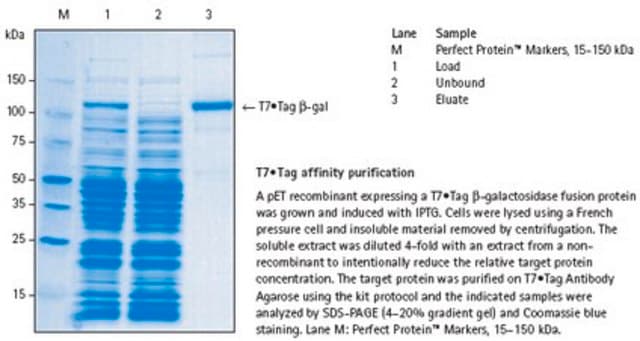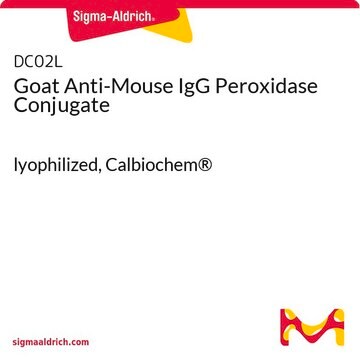69026
T7•Tag® Antibody Agarose
Sinónimos:
T7 Tag Antibody
Iniciar sesiónpara Ver la Fijación de precios por contrato y de la organización
About This Item
UNSPSC Code:
41106500
NACRES:
NA.56
Productos recomendados
form
liquid
Quality Level
manufacturer/tradename
Novagen®
storage condition
do not freeze
shipped in
wet ice
storage temp.
2-8°C
General description
The T7•Tag Antibody Agarose is designed for rapid immunoaffinity purification of target proteins that carry the T7•Tag sequence (i.e., the amino terminal 11 aa of the T7 gene 10 protein). Purification is based on binding target proteins to T7•Tag monoclonal antibody that is covalently coupled to cross-linked agarose beads, washing away unbound proteins, and eluting at pH 2.2. Capacity will vary somewhat between different target proteins, but the beads are standardized to bind a minimum of 300 µg T7•Tag β-galactosidase per milliliter of settled resin. The beads can be used in either batch or column methods and can be recycled a minimum of five times without loss of binding activity.
Warning
Toxicity: Standard Handling (A)
Legal Information
NOVAGEN is a registered trademark of Merck KGaA, Darmstadt, Germany
T7-Tag is a registered trademark of Merck KGaA, Darmstadt, Germany
Storage Class
12 - Non Combustible Liquids
wgk_germany
WGK 3
flash_point_f
Not applicable
flash_point_c
Not applicable
Certificados de análisis (COA)
Busque Certificados de análisis (COA) introduciendo el número de lote del producto. Los números de lote se encuentran en la etiqueta del producto después de las palabras «Lot» o «Batch»
¿Ya tiene este producto?
Encuentre la documentación para los productos que ha comprado recientemente en la Biblioteca de documentos.
Satoshi Hirano et al.
Autophagy, 12(2), 312-326 (2016-02-24)
MAP1LC3/LC3 (a mammalian ortholog family of yeast Atg8) is a ubiquitin-like protein that is essential for autophagosome formation. LC3 is conjugated to phosphatidylethanolamine on phagophores and ends up distributed both inside and outside the autophagosome membrane. One of the well-known
Sara R Heras et al.
Nature structural & molecular biology, 20(10), 1173-1181 (2013-09-03)
More than half of the human genome is made of transposable elements whose ongoing mobilization is a driving force in genetic diversity; however, little is known about how the host regulates their activity. Here, we show that the Microprocessor (Drosha-DGCR8)
Subhashini Sadasivam et al.
Genes & development, 26(5), 474-489 (2012-03-07)
Cell cycle progression is dependent on two major waves of gene expression. Early cell cycle gene expression occurs during G1/S to generate factors required for DNA replication, while late cell cycle gene expression begins during G2 to prepare for mitosis.
Kazufumi Ohshiro et al.
Genes & cancer, 11(1-2), 43-52 (2020-06-25)
Recently, we observed that the TGF-β pathway is altered in 39% of HCCs. The alterations are correlated with a raised HMGA2 level. Therefore, we compared genetic alterations of HMGA2 and 43 TGF-β pathway core genes in HCC patients from TCGA
Regulated degradation of HMG CoA reductase requires conformational changes in sterol-sensing domain.
Hongwen Chen et al.
Nature communications, 13(1), 4273-4273 (2022-07-26)
3-Hydroxy-3-methylglutaryl coenzyme A reductase (HMGCR) is the rate-limiting enzyme in cholesterol synthesis and target of cholesterol-lowering statin drugs. Accumulation of sterols in endoplasmic reticulum (ER) membranes accelerates degradation of HMGCR, slowing the synthesis of cholesterol. Degradation of HMGCR is inhibited
Nuestro equipo de científicos tiene experiencia en todas las áreas de investigación: Ciencias de la vida, Ciencia de los materiales, Síntesis química, Cromatografía, Analítica y muchas otras.
Póngase en contacto con el Servicio técnico








